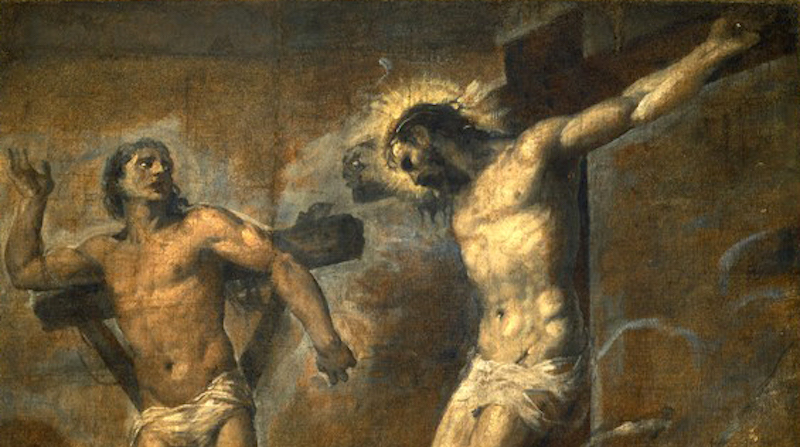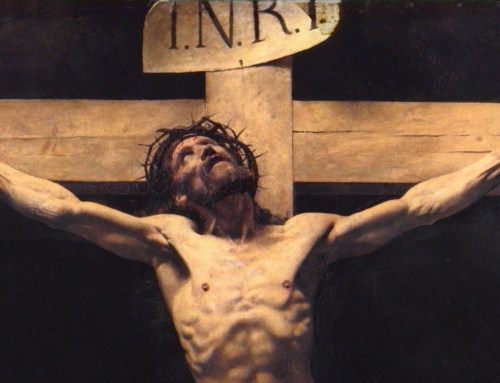“Man is a beggar before God.” These words of the Church’s Catechism reveal something of our fundamental dependence on God. This need is perhaps nowhere better exemplified than in St. Luke’s account of the good thief.
Now one of the criminals hanging there reviled Jesus, saying, “Are you not the Messiah? Save yourself and us.” The other, however, rebuking him, said in reply, “Have you no fear of God, for you are subject to the same condemnation? And indeed, we have been condemned justly, for the sentence we received corresponds to our crimes, but this man has done nothing criminal.” Then he said, “Jesus, remember me when you come into your kingdom.” He replied to him, “Amen, I say to you, today you will be with me in Paradise. (Luke 23:39-43)
Saint Dismas, the good thief, has much to teach us. Dying upon a tree, mocked by the world, and knowing his guilt, Dismas is utterly poor before Jesus. He has no good work to fall back on, no beauty to present, nothing witty to say. He is a man who truly has nothing. And yet he is declared by Jesus to be the first in paradise, and will forever be known as the thief who stole heaven. But we might be asking ourselves, how can this be?
Saint Dismas is in heaven not because he snuck in through the back gate. Nor did he steal heaven as if it were something to be taken. Rather, he joined Jesus in the kingdom because, at the last moment of his life, he was given the grace to acknowledge his own utter unworthiness before God. A thief does not steal because of what he has but because of what he lacks. It is precisely because Dismas the thief acknowledged himself as Dismas the beggar that he was saved. In his utter poverty, he could receive all the mercy that God wished to give him.
We too must learn to embrace more and more our poverty before God. But how can we do this? To help us become beggars before God, we can look to St. Therese of Lisieux, who teaches us a little way of confident love and childlike simplicity. She often compares our need for God to the relationship between a young child and his parents. A child is utterly dependent on his parents. He goes to them for everything and he never questions his parents’ ability to fix his problems. Indeed, this is how we ought to see God. We have received and continue to receive everything from him. To be childlike, then, is to go to God for our every need, to have complete faith in his providential care, and to love him unreservedly.
But Saint Therese’s confident love goes even further than just acknowledging her poverty and her weakness. She exults in it and loves the God who flies to make up for her deficiencies and faults. Like St. Paul, she glories in weakness and in what the Lord has been able to do in her (2 Cor 12:9). This confidence knows that there is no wound so great nor wickedness so ingrained that the Lord cannot heal it if only we ask his forgiveness. So, rather than feeling shame over our weakness and poverty, we have an opportunity to call upon God’s mercy. Confidence in God’s merciful love is the key to childlike dependence and paves the road on the way to heaven. For, it is when we acknowledge that we have nothing that we find ourselves truly rich. Indeed, man is a beggar before God, one who begs the kingdom of heaven and it is given to him.
✠
Image: Titian, Christ and the Good Thief







